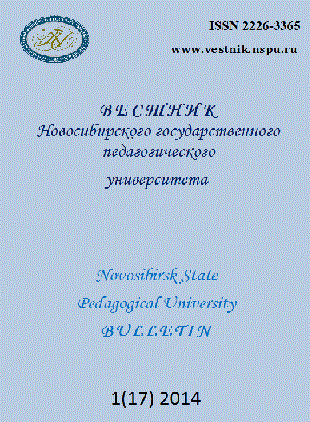ПСИХИЧЕСКОЕ ЗДОРОВЬЕ ЖЕНЩИН, ВОВЛЕЧЕННЫХ В ПРОЦЕСС НЕПРЕРЫВНОГО ОБРАЗОВАНИЯ
THE SENSE OF WELL-BEING OF WOMEN INVOLVED IN LIFELONG EDUCATION
Author(s): Hanna Liberska, Marzanna FarnickaSubject(s): Psychology
Published by: Новосибирский государственный педагогический университет
Keywords: lifelong education; well-being; mental; social; emotional and physical condition; professional development; self-education
Summary/Abstract: In the article authors consider importance of continuous education in a life adult, in particular, women. In the era of intense development of civilisation and technology, education of adults is not just a chance of realisation of professional carrier, but also brings a chance of meeting the expectations as to the socio-economic status, family life, forms of leisure activity. political activity and others. In the time of economical crisis, the worth of education increase because of the possibility of getting the ability to adapt to the actual conditions on the job market. educational activity of adults can be a factor favouring maintenance or improving the state of psychological wellbeing. Increasing knowledge improves and offers opportunities for social and professional advancement. Further, the authors note that for many centuries the sphere of education and professional career were the domain of men, while women were supposed to take care of home and children. The access to education and professional development that has been saved up by women over the last few decades was a great breakthrough in social evolution. The question is if this access to education and professional life has contributed to the wellbeing of women. Perhaps the access to new spheres of development (long time education and professional activity) has reduced the sense of wellbeing by limiting the women engagement in the activities related to taking care of the family. Authors put forward the working hypotheses connected with the general well-being, mental, social and emotional well-being of the women who are engaged in self-education and those women which are not engaged in it. To check up aforementioned hypotheses, the comparative research of two groups of women, on 30 people in each group, has been carried out everyone at the age from 21 till 35 years. One group included women who were continued life-long education and other group of women which did not continue education. All women worked, and all had families (the husband, the child or children). They lived in cities or suburbs with the population approximately 60000 inhabitants. As tools of research authors used questionnaire for an estimation of mental well-being (L. Wojciechowska, 2008). Authors come to conclusions, that the women continuing life-long education, had the best mental, social, emotional and physical condition in comparison with those who were not educated.
Journal: Вестник Новосибирского государственного педагогического университета
- Issue Year: 2014
- Issue No: 1
- Page Range: 175-183
- Page Count: 9
- Language: Russian

